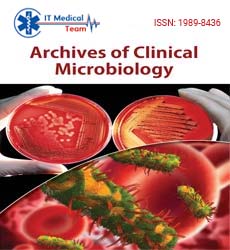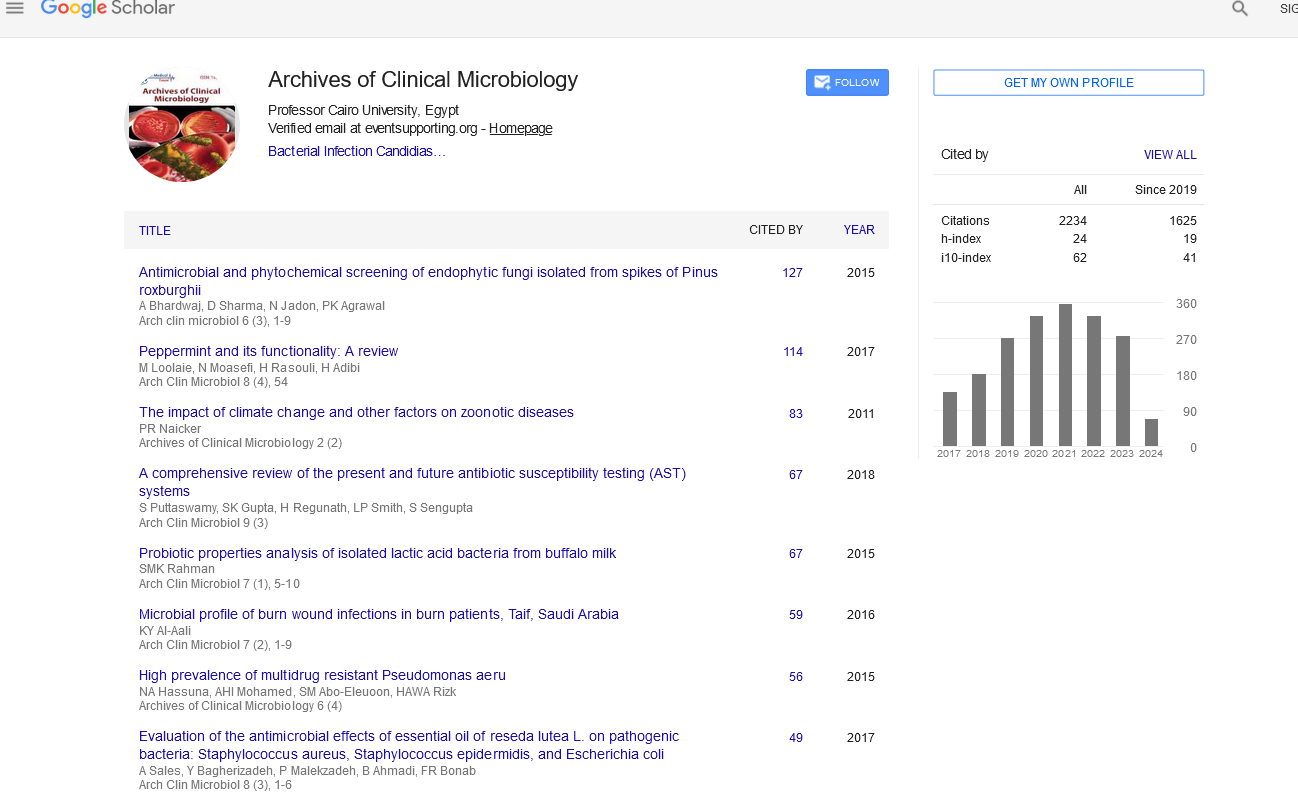Perspective - (2024) Volume 15, Issue 4
Advances in Vaccine Development and Its Implications for Microbial Infections
Joann McDermid*
Department of Molecular Microbiology and Immunology, Johns Hopkins University, Maryland, USA
*Correspondence:
Joann McDermid, Department of Molecular Microbiology and Immunology, Johns Hopkins University, Maryland,
USA,
Received: 18-Jun-2024, Manuscript No. IPACM-24-14965;
Editor assigned: 21-Jun-2024, Pre QC No. IPACM-24-14965 (PQ);
Reviewed: 05-Jul-2024, QC No. IPACM-24-14965;
Revised: 15-Jul-2024, Manuscript No. IPACM-24-14965 (R);
Published:
22-Jul-2024
Introduction
Vaccines represent one of the most significant achievements
in public health, providing effective prevention against a wide
range of microbial infections. This article explores the evolution
of vaccine development, recent advancements in vaccine
technologies, their implications for controlling infectious
diseases, challenges in vaccine deployment, and the future
directions of vaccine research in combating global health threats.
Vaccines have revolutionized disease prevention by stimulating
the immune system to recognize and respond to specific
pathogens without causing disease. The development of
vaccines has significantly reduced the global burden of infectious
diseases, prevented millions of deaths annually, and facilitated
disease eradication efforts. Recent decades have witnessed
remarkable progress in vaccine research and technology,
enhancing vaccine efficacy, safety, and accessibility across
diverse populations worldwide.
Description
Evolution of vaccine development
The history of vaccine development dates back to the 18th century, with Edward Jenner's pioneering work on smallpox
vaccination. Over centuries, vaccine development has evolved
from empirical approaches to systematic research involving
immunology, microbiology, molecular biology, and biotechnology:
Traditional vaccine platforms: Traditional vaccines, including
live attenuated vaccines (e.g., measles, mumps, rubella),
inactivated vaccines (e.g., polio, influenza), and subunit vaccines
(e.g., hepatitis B), have been instrumental in disease prevention
through induction of protective immunity against specific
pathogens.
Recombinant DNA technology: Advances in recombinant DNA
technology enabled the development of recombinant subunit
vaccines (e.g., hepatitis B, human papillomavirus) and vector-based
vaccines (e.g., adenovirus vectors for Ebola virus), which
express antigenic proteins to induce immune responses without
causing disease.
mRNA vaccines: mRNA vaccine technology, exemplified by
the Pfizer-BioNTech and Moderna COVID-19 vaccines,
represents a breakthrough in vaccine development. mRNA
vaccines deliver genetic instructions to host cells to produce viral
antigens, eliciting robust immune responses against SARS-CoV-2
and demonstrating rapid scalability during pandemics.
Recent advances in vaccine technologies
Recent advancements in vaccine technologies have expanded
capabilities in vaccine design, delivery, and immunogenicity:
Nanoparticle vaccines: Nanoparticle based vaccines, such as
Virus Like Particles (VLPs) and liposomes, mimic the structure of
pathogens to enhance antigen presentation and immune
recognition, improving vaccine efficacy against challenging
pathogens like human papillomavirus and respiratory syncytial
virus.
Adjuvants and immunomodulators: Adjuvants, such as
aluminum salts and toll-like receptor agonists, enhance vaccine
immunogenicity by stimulating innate immune responses and
promoting durable immunity. Immunomodulators, including
cytokines and immune checkpoint inhibitors, modulate immune
responses to optimize vaccine efficacy and duration of
protection.
Virus vectored vaccines: Viral vector vaccines, utilizing
replication-deficient adenovirus or Modified Vaccinia virus
Ankara (MVA) vectors, deliver genetic material encoding viral
antigens to host cells, eliciting potent cellular and humoral
immune responses against pathogens like Ebola virus and
malaria parasites.
Implications for controlling microbial infections
Vaccines play a pivotal role in controlling microbial infections
through several mechanisms:
Disease prevention: Vaccines prevent infections by inducing
protective immunity against specific pathogens, reducing
transmission within communities and preventing outbreaks in
vulnerable populations.
Herd immunity: High vaccine coverage levels within
populations establish herd immunity, protecting unvaccinated individuals, including infants, elderly adults, and
immunocompromised individuals, from infectious diseases.
Eradication and elimination: Successful vaccination campaigns
have led to the eradication of smallpox and near-elimination of
polio, demonstrating the feasibility of eliminating infectious
diseases through global vaccination efforts.
Pandemic preparedness: Rapid vaccine development and
deployment during pandemics, such as COVID-19, mitigate
disease spread, reduce morbidity and mortality, and support
global health security by enhancing pandemic preparedness and
response capabilities.
Challenges in vaccine deployment
Despite progress, challenges in vaccine deployment and
acceptance persist:
Vaccine hesitancy: Vaccine hesitancy, fueled by misinformation,
safety concerns, and lack of trust in healthcare systems, poses
barriers to achieving high vaccination coverage and population
immunity.
Cold chain requirements: Cold chain logistics, maintaining
vaccines at recommended temperatures during storage,
transport, and distribution, are essential for vaccine efficacy and
pose logistical challenges in resource limited settings.
Emerging variants: Viral variants, such as SARS-CoV-2 variants
of concern (e.g., Delta variant), may impact vaccine effectiveness
and necessitate ongoing surveillance, vaccine adaptation, and
booster dose strategies to maintain protective immunity.
Future directions in vaccine research
The future of vaccine research is focused on addressing
emerging challenges and expanding vaccine capabilities:
Universal vaccines: Development of universal vaccines
targeting conserved epitopes across viral strains to provide
broad spectrum protection against influenza, coronaviruses, and
other rapidly mutating pathogens.
Personalized vaccines: Personalized vaccine approaches,
leveraging genomic sequencing and immune profiling, to tailor
vaccine formulations and schedules based on individual immune
responses and susceptibility to infectious diseases.
Next generation adjuvants: Advancement of novel adjuvants
and delivery systems to enhance vaccine potency, durability of
immune responses, and cross-protective immunity against
diverse pathogens.
Global access and equity: Promoting equitable access to
vaccines through international partnerships, technology transfer,
and capacity building initiatives to ensure global readiness for
future pandemics and endemic diseases.
Conclusion
Advances in vaccine development have transformed our
ability to prevent and control microbial infections, shaping
global health outcomes and pandemic preparedness. From
traditional approaches to cutting-edge technologies like mRNA
vaccines, the evolution of vaccine science underscores the
importance of innovation, collaboration, and investment in
public health interventions.
As we navigate the complexities of vaccine deployment,
address vaccine hesitancy, and adapt to emerging infectious
threats, ongoing research, surveillance, and global cooperation
are essential for advancing vaccine efficacy, accessibility, and
equity. By harnessing the power of vaccines, stakeholders can
mitigate the impact of infectious diseases, protect vulnerable
populations, and build resilient healthcare systems capable of
responding to current and future public health challenges.
Citation: McDermid J (2024) Advances in Vaccine Development and Its Implications for Microbial Infections. Arch Clin Microbiol Vol:15 No:4





